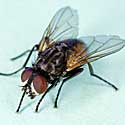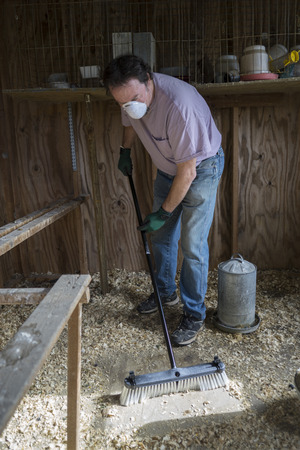
Chickens do not attract flies. Filth attracts flies. Backyard chickens are confined to an unnatural environment, and problems arise when that environment lacks proper management. An accumulation of moist droppings provides an ideal place for flies to lay eggs and for the eggs to develop into maggots, which in turn make more flies. Droppings can’t dry out sufficiently to discourage flies where ventilation is poor, drinkers leak, or rainwater seeps into the coop.
The common house fly and other filth-breeding flies don’t bite, but if they get too numerous they can irritate chickens, discouraging hens from laying eggs. Flies can also transmit tapeworm and roundworm, and spread bacterial and viral diseases. Flies also leave annoying specks on eggs, and they can bother neighbors, sometimes leading to a nuisance-abatement lawsuit.
Controlling flies requires minimizing fly breeding sites. Here’s how:
- Maintain dry litter inside the coop. Avoid such moisture sources as a leaky drinker, a leaky roof, and runoff seepage from a poorly graded yard.
- Avoid damp breeding sites in the yard. Keep weeds well mowed, and eliminate low spots that accumulate puddles.
- Install a ceiling fan in the coop to improve ventilation and help dry out droppings and litter. Since flies don’t like moving air, a ceiling fan also keeps them from bothering the chickens.
- Frequently remove manure accumulations and periodically replace soiled litter.
- Leave a little manure behind to ensure the survival of natural fly predators. Although you can encourage these beneficial insects to populate your coop, where flies are present, fly predators will arrive on their own.
- Dispose of used litter where it won’t attract more flies — compost it, bury it, or spread it on a field or fallow garden.
Even if flies get out of hand, avoid using chemical insecticides. They affect fly predators more than they affect flies, because over the years flies have developed some degree of resistance to many commonly used products. Limit fly-control measures to those that attract flies without coming into contact with manure, such as fly traps and sticky fly ribbon. Hang traps and ribbon close to the coop ceiling, and replace them periodically to ensure they maintain effectiveness.
And that’s today’s news from the Cackle Coop.
Gail Damerow, author, The Chicken Health Handbook



Very helpful
… Also, love this blog… 🙂
Excellent article! Very helpful and informative.